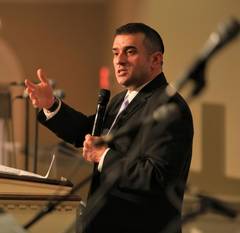- About Us
- Learning
- Resources
- Get Involved
- Membership
- Jobs
The Hardest Part
12/01/2014 06:50:00 PM
| Author | |
| Date Added | |
| Automatically create summary | |
| Summary |
Prayer does not cure cancer.
Prayer does not end endemic racism.
Prayer gives voice to our souls, focus to our lives and comfort to our egos. Nothing more, nothing less.
At those moments when we are down, the liturgy tells us that we have been given another day on this planet because the Creator has faith that we will do something useful, productive, beautiful with this day.
At those moments when we are full of ourselves, the liturgy comes to remind us that our own righteousness, might and wisdom are nothing.
Prayer is also, I think, the hardest part of Jewish life for American liberal Jews. For many of us, there is a nagging sense that there is - or should be - something there that is meaningful, yet we can't quite access it. So, we go through the motions when circumstances seem to demand it, like at Yom Kippor or someone's bar mitzvah, and when we seek spiritual sustenance, we tend to look elsewhere.
Hebrew schools - both at BHA and at virtually every other liberal community that I know of - tend to focus precisely on the motions. When to sit, when to stand, how to make the sounds of a language few of us (who aren't Israeli) have comfort with. Questions of to whom (or Whom) we are speaking, why we are speaking or what we are trying to say are dealt with marginally, if at all.
Here at BHA, we've been trying this year to get past problems of proper parroting and get into what it means for us to pray. One of the things we have been trying is a monthly Saturday morning service together with the Hebrew school. There are parallel components for adults, older kids and younger kids, and the services are open to everyone, regardless of Hebrew school enrollment or anything else.
I lead services for the adults and older kids, while Cantor Ellen Gersh, Debbie Broshi and Wendy Alexander lead programs for the younger kids.
In all of the services, we are trying to focus on the internal dynamics of davvening - more on how our souls move and less on how our lips move.
Our next service of this type is this Saturday, from 10-12, and I hope you can make it. It should be of particular interest to those of us with souls we haven't fully figured out how to use, those of us who want to learn and teach Judaism from a place of integrity, and those who simply want to have a more nuanced understanding of expressions of Judaism in the broader culture, such as Allen Ginsberg's Kaddish, Phish's Avinu Malkenu and Leonard Cohen's Unatana Tokef.
Hope to see you this Saturday at 10!
Thu, November 6 2025
15 Cheshvan 5786
RABBI BRENT SPODEK

Join Our Mailing List
Privacy Settings | Privacy Policy | Member Terms
©2025 All rights reserved. Find out more about ShulCloud


